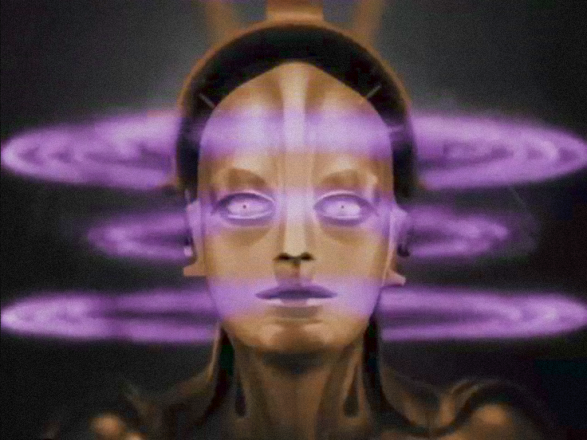Reviews
Fritz Lang & Giorgio Moroder
USA, 1984
Credits
Review by Victoria Large
Posted on 20 November 2011
Source Digital projection
As a card-carrying film geek (literally, if you count rep cinema memberships), I generally do not want the films I watch to be modified from their original versions, or formatted to fit my screen. I don’t want them edited to run in the time allotted or for content, dubbed rather than subtitled, or colorized from black and white. So of course, on some level, I know that I probably shouldn’t like famed record producer Giorgio Moroder’s 1984 color-tinted, pop music-scored remix of Fritz Lang’s 1927 silent classic Metropolis.
To wit: when I first tracked down a copy of the infamous Moroder version on out-of-print Vestron VHS, my video store had plastered a warning across its cover that read, “Please note: new soundtrack and colorized.” They had presumably done so in order to avoid disgruntled film geeks storming into their store and demanding to know why on earth this copy of Metropolis included songs by Freddy Mercury and Pat Benatar. Still, the Moroder version has its fans, and I may as well cop to being one of them. So I’m happy that a restoration of the Moroder version is finally hitting the twenty-first century home video market on DVD and Blu-Ray this month, and I couldn’t resist hitting a screening when it recently played my beloved Brattle Theatre.
I’d seen Metropolis in a theater twice before attending a screening of the Moroder version - first I saw the 2002 restoration, and then the 2010 “complete” version, if you’re keeping track - and it speaks to the film’s tortured history that I’ve now seen three different variations of Lang’s masterpiece on the big screen. The question hovering over the Moroder version - which includes modern sound effects, subtitles instead of traditional silent film intertitles, and sped-up frames in addition to the aforementioned color tinting and revamped soundtrack - is whether it’s a worthy cinematic endeavor or just another of the many instances in which Metropolis has been twisted, truncated, and generally mistreated. I certainly understand why people argue that it’s the latter: imagine someone deciding that one of your favorite films from any era would be better once they were finished brightening up the colors and retrofitting it with a modern soundtrack, and you’ll see what I mean.
But even in 1984, before Metropolis had been as carefully reconstructed as it has been now, Moroder’s version was not the only way to see the film, and it’s been argued that his slick, ’80s repackaging of the classic helped it to win new fans and drew needed attention to its history of shabby treatment. Moroder’s version may tinker with the original both significantly and controversially, but it also represented an attempt to restore the film to both visual crispness and narrative comprehensibility (Moroder filled in some long-standing narrative gaps through the use of screenwriter Thea Von Harbou’s novel version of Metropolis as a reference). Even though there is arguably a whiff of hubris attached to the way Moroder placed his name before the title of Lang’s existing masterpiece, I can’t help feeling that Moroder’s Metropolis was born out of a genuine love for the film in much the way that later restoration projects seem to have been.
But maybe I’m just used to this sort of thing these days. Moroder’s Metropolis preceded the emergence of our current culture of appropriations and mash-ups, but it also seems to anticipate it. In an era when one can hop on Youtube and watch Fred Astaire and Rita Hayworth glide around in a recut music video set to Mazzy Star’s “Fade Into You,” or hunt down a supercut isolating every use of the word “Dude” in The Big Lebowski, it may be easier to grin at the way Moroder has reimagined the scene where Metropolis’ sinister humanoid robot comes to life, this time with sci-fi sound effects, a rock soundtrack, and color-tinted electric currents flashing in the robot’s eyes.
It would be hard to argue that Moroder’s Metropolis doesn’t have its moments of almost sublime silliness: how could it not, with Bonnie Tyler incongruously rasping, “Here she comes! Here she comes!” over scenes of Brigitte Helm’s sinister, shimmying evil robot; and Loverboy shouting, “DE-STRUCT-ION!” when the workers of Metropolis revolt? (Incidentally, I always hear that lyric as “DIS-CRET-TION!” as if Loverboy are making a plea against the impending violence.) But that’s all part of the loopy ride, and honestly? It’s pretty fun.
While I had previously seen the more straightforward recent restorations of Metropolis at early weekend matinees packed with earnest cineastes and curious culture vultures, I happened to catch a relatively late show of the Moroder version, and that felt exactly right. The Moroder version has a dreamy strangeness that is perhaps best suited to late night screenings, but I want to emphasize that Moroder’s Metropolis on the big screen is still Metropolis on the big screen, which means that it’s still full of arresting, intoxicating visuals. And since this sometimes-maligned remix seems to lack the intimidation factor of those more straightforward restorations, I’ve twice seen it with friends who don’t typically watch silent films—and who’ve thoroughly enjoyed themselves. The Moroder version can serve as a way into Lang’s world, and into the world of silent film, and there’s real value in that. I’m glad it’s back in circulation.
We don’t do comments anymore, but you may contact us here or find us on Twitter or Facebook.



